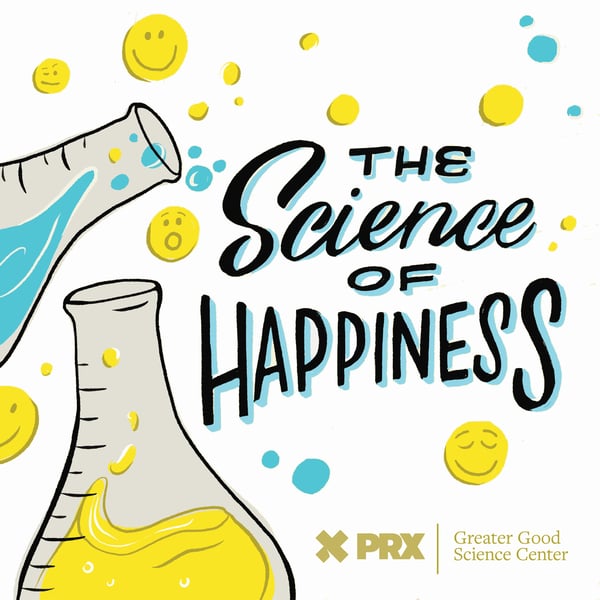Catch Yourself in a Dream
The Science of Happiness
PRX and Greater Good Science Center
4.4 • 1.9K Ratings
🗓️ 26 May 2022
⏱️ 21 minutes
🧾️ Download transcript
Summary
Have you ever known you're dreaming while you're asleep? Our guests try practices to help induce lucid dreams, and we hear what they can teach us about consciousness.
Episode summary:
How do you know you’re awake? Are you sure? Practicing lucid dreaming means taking a step back to question your very consciousness — throughout your day, and even when you’re asleep. It’s no wonder lucid dreaming is associated with mindfulness. In this episode, journalists Marylee Williams and Michaeleen Doucleff try a practice to induce lucid dreaming, and researcher Benjamin Baird explains what lucid dreaming is teaching scientists about consciousness, plus how it might benefit our well-being. Lucid dreaming appears to help foster creativity and can boost your mood when you wake up.
Try Lucid Dreaming
There are a few different ways to induce lucid dreams. All of them take time and practice. Find a brief summary below and more information at this link: https://tinyurl.com/2m86pw7p
(i) Reality Testing (RT), a technique that involves checking your environment several times a day to see whether or not you’re dreaming;
(iii) MILD, a technique that involves waking up after five hours of sleep and then developing the intention to remember that you are dreaming before returning to sleep, by repeating the phrase ‘The next time I’m dreaming, I will remember that I’m dreaming;’ you also imagine yourself in a lucid dream;
(iv) SSILD, a technique that involves waking up after five hours of sleep and then repeatedly focusing your attention on visual, auditory, and physical sensations for 20 seconds each before returning to sleep; this technique is similar to mindfulness meditation but involved repeatedly shifting your focus;
More Resources:
Lucid Dreaming FAQ by The Lucidity Institute: https://tinyurl.com/2m86pw7p
Lucid Dreaming at TEDx: https://tinyurl.com/ywkymhs2
Learn about the cognitive neuroscience of lucid dreaming from today’s expert Benjamin Baird: https://tinyurl.com/mr3anzer
More sleep resources from The Greater Good Science Center:
Why Your Brain Needs to Dream: https://tinyurl.com/yc3makhp
The Influence of Dreams: https://tinyurl.com/p6cfh8n4
How Mindfulness Improves Sleep: https://tinyurl.com/39tk85m9
Your Sleep Tonight Changes How You React to Stress Tomorrow: https://tinyurl.com/2p8zvbjz
Dear Christine: Why Can’t I Sleep? https://tinyurl.com/yb88a5z6
Today’s guests:
Michaeleen Doucleff f is a science reporter for NPR and author of the book Hunt, Gather, Parent.
Check out her reporting: https://tinyurl.com/5de2kyt7
Read her book: https://michaeleendoucleff.com/
Follow Michaeleen on Twitter: https://twitter.com/FoodieScience
Mary Lee Williams is an editor and producer on a morning news show in Pittsburgh, Pennsylvania
Check out her website: http://www.maryleewill.com/about
Follow on Twitter: https://twitter.com/marylee_will
Benjamin Baird is a Research Assistant Professor at The University of Texas at Austin, where he focuses on consciousness, including lucid dreaming.
Check out Dr. Baird’s website: https://www.benjaminbaird.org/
Tell us about your experiences and struggles with lucid dreams by emailing us at [email protected] or using the hashtag #happinesspod.
Help us share The Science of Happiness OR HB!
Leave us a 5-star review and copy and share this link: pod.link/1340505607
Transcript
Click on a timestamp to play from that location
| 0:00.0 | I was sitting in a very bright kind of white room. |
| 0:12.6 | I grew up along the Mississippi River and I could like see the river in the background. |
| 0:17.8 | It was very dramatic and grand and there was always a bench there and it was always open. |
| 0:23.6 | I was sitting there and it was like really bright white and then all started to kind of |
| 0:27.0 | like come in and bold colors. |
| 0:30.2 | I was like, oh, this is a weird place to be and it was so quiet. |
| 0:39.5 | And then I was like, huh, I need to look at the clock and I like turn my head, I turn |
| 0:44.9 | my shoulder and my alarm clock was there just kind of in the ether and I remember before |
| 0:51.3 | I went to sleep, I had looked at the clock to confirm what time it was like 4 a.m. and |
| 0:56.6 | then when I turned and looked at the clock this time, it was 1 a.m. and I was like, that's |
| 1:00.1 | not how time works. |
| 1:02.3 | And I took my hand and I put it against my skull and it went in, it just like jelly, |
| 1:08.0 | it just like gooped through and then I heard my mother's laugh but it was like creepy, |
| 1:14.6 | it was really scary and my hand turned my skull and my mom was laughing and I was like, oh my |
| 1:19.0 | gosh. |
| 1:27.3 | And then I woke myself up. |
| 1:34.8 | When we have a really intense dream, sometimes we make ourselves wake up, it's a self-protective |
| 1:39.9 | mechanism. |
| 1:41.2 | We can also do something else in our dreams, realize we're dreaming, lucid dreaming. |
| 1:46.6 | The Dutch psychiatrist Frederick Wilhelm Von Aiden coined the term lucid dreaming in 1913 |
| 1:52.7 | but really descriptions of lucid dreams date back to Aristotle and even before. |
| 1:57.3 | I'm Dacker Keltner, welcome to the science of happiness. |
... |
Please login to see the full transcript.
Disclaimer: The podcast and artwork embedded on this page are from PRX and Greater Good Science Center, and are the property of its owner and not affiliated with or endorsed by Tapesearch.
Generated transcripts are the property of PRX and Greater Good Science Center and are distributed freely under the Fair Use doctrine. Transcripts generated by Tapesearch are not guaranteed to be accurate.
Copyright © Tapesearch 2025.

